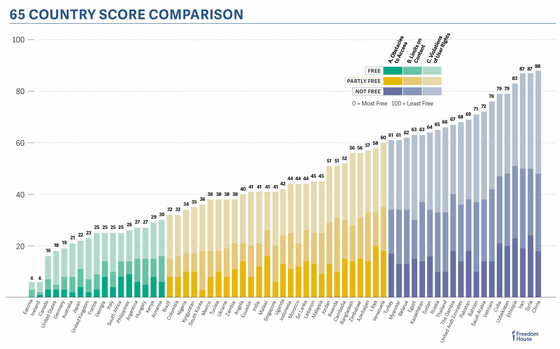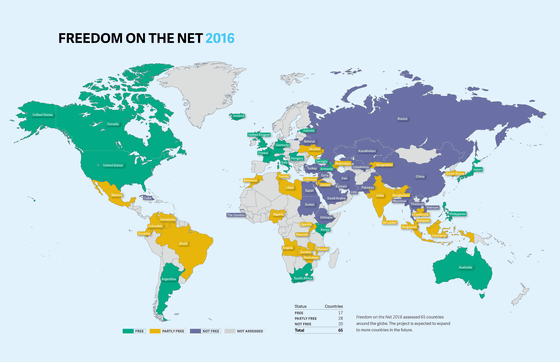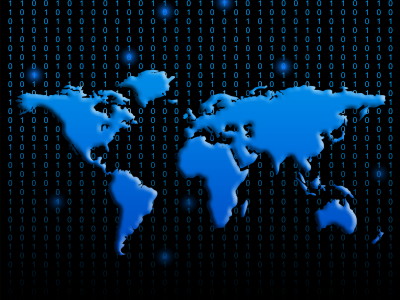Two thirds of the Internet users all over the world live in government censorship

ByHaruhiko Okumura
In 1941 it was founded as an institution to monitor freedom and democracy against Nazi · GermanyFreedom Houseis. A report that examines the degree of freedom of the Internet of the world that Freedom House publishes every year "Freedom on the Net"The 2016 version of the edition has been released.
Freedom on the Net 2016 | Freedom House
https://freedomhouse.org/report/freedom-net/freedom-net-2016
The following graph scored the degree of freedom of the Internet environment of 65 countries and regions subject to survey. The score is a comprehensive evaluation of three scales of "presence / absence of access disorder", "content restriction", "interference with user rights" on the Internet, and the closer the score is to 0, the closer the Internet environment is to the country When it is close to 100, censorship etc. are strict and it indicates that it is environment with less freedom. When the graph is green, it is evaluated as "free internet", "partially free" internet in the case of yellow, "restricted Internet" in the case of blue. Estonia and Iceland have the most liberal Internet environment among the 65 countries and regions surveyed, with a score of "6". Japan is rated "22", the seventh lowest score overall, and is a country where free internet is offered. The most restrictive Internet environment is China's.

In addition, Internet users in the countries and regions surveyed were classified as "Free Internet (green)", "Partially Free Internet (Yellow)" "Restricted Internet (Blue)" "Not Surveyed (Ash)" In total, 88% of users can access the Internet, whose population exceeds 1.2 billion. Of that, only 24% of users can access the free Internet, and of course 24% of Internet users in Japan are included.

A diagram showing "Free Internet (Green)", "Partially Free Internet (Yellow)" "Restricted Internet (Blue)" "Not Surveyed (Ash)" on the World Map.

The map showing the distribution of more than 1.2 billion Internet users that was the subject of survey is as follows. It shows one million Internet users in a hexagon, so you can tell at a glance which Internet users there are in many countries and regions. Most of the Internet users are the most restricted China with about 690 million people, under India about 340 million people, about 240 million people in the US, about 122 million people in Brazil, It is followed by 118 million people in Japan.

The graph below shows the ranking of the top 20 countries with a high overall score reduction. The decrease in total score, that is, the regulation of the Internet was the easiest in Uganda, followed by Bangladesh, Cambodia, Ecuador and Libya.

On the contrary, five countries, Ukraine, Venezuela, Turkey, Russia and Ethiopia, have scored the largest scores in the past five years (Internet censorship and regulation became stronger).

The graph below shows the countries that have different degrees of freedom in the Internet environment and freedom of the press. Bar graphs and scores indicate degrees of freedom in the nation's Internet environment, and the scores written in the triangle icons indicate the freedom of the press. Particularly regulations on the media are particularly strong in Uzbekistan, and Cuba and Belarus are particularly highly regulated countries with scores above 90. Although Armenia offers a free Internet environment, the regulation for the press is quite strong, and it is interesting to see such gap.

The following graph shows the number of countries (blue) that are restricted and the number of countries that issued arrestees (pink) for each SNS and communication application. The application restricted in the most countries is "WhatsApp", the service that arrested in the most countries is Facebook. Facebook users seem to be arrested in many cases from political or religious comments.

The graph below shows the degree of freedom of the Internet environment on the horizontal axis, the degree of Internet penetration on the vertical axis and the size of the yen in GDP per citizen.

The following graph shows what field topics the censorship and restrictions of the Internet are done on. The number next to the country name indicates the number of topics subject to restriction, and if it is 0, it means that it is a country where you can enjoy unlimited free internet. In China, Iran and Ethiopia the restrictions on the most topics were restricted, "criticism against authority" was subject to censorship and restriction in the most countries.

Related Posts:
in Note, Posted by logu_ii







